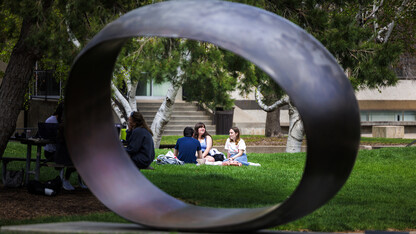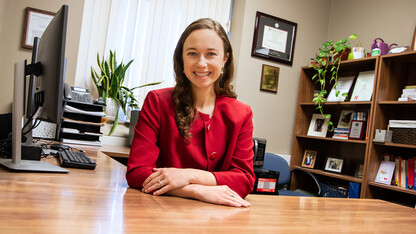· 8 min read
Rempe found home at Dear Old Nebraska U

Editor's Note — This Q&A is part of a weekly student conversation series that is celebrating Women's History Month on the University of Nebraska–Lincoln's Medium page. The series will feature students who are making impacts on campus and look to maintain that momentum in future careers. Learn more about Women's History Month coverage in Nebraska Today.

his week, meet Olivia Rempe, a marketing major from Glenview, Illinois. After confronting substance abuse and reprioritizing her life, she’s thriving in the College of Business, setting goals for the future and using her story to encourage others.
Talk about battling substance abuse.
I have dealt with a substance abuse problem throughout my life, and it wasn’t until college that it started to take its toll on my life. The mind of an alcoholic is hard to describe to the non-alcoholic. Still, the best way to put it is that the sensation of drinking is so elusive that after time you cannot differentiate the true from the false, and after time, the alcoholic life seems like the only normal one.
I considered getting sober before, but I always thought that I wouldn’t be myself without drinking if I did. I kind of developed this reputation as someone who goes out a lot and gets crazy, and I thought that I couldn’t be me without alcohol. Substance abuse, for reasons so obscure, caused me to lose all willpower. I could not bring into consciousness with sufficient force the memory of suffering and humiliation of even a week or a month ago. I would try to regain control of my life, but such intervals — usually brief — were inevitably followed by still less power, which led in time to my rock bottom. Few alcoholics have enough desire to stop while there is yet time, and unless this person can experience an entire psychic change, there is little hope. This change cannot come about based on self-knowledge and must be grounded in the ideals of something greater than yourself.
How did you reprioritize your life when you returned to school?
Recovery was no easy process, and when I returned to school in the fall of 2019, I wandered around, feeling lost and unsure of who I was and what to do with myself. I had been half asleep all my life and here I was trying to figure out what I was like before I woke up. I didn’t have anything to keep me grounded or prevent me from falling off the wagon, but my mentors across campus showed me the answer. I needed to invest in myself and my future. They helped me dive headfirst into my education, guiding me to find ways to better myself through higher education. I was encouraged to join student organizations to find other ways to be social aside from the party scene. Investing my time into involvement within the College of Business showed me a new path to my future.
I began by joining the professional business fraternity Alpha Kappa Psi. I originally joined to get my parents off my back about getting involved, so I had more to put on my resume, but instead, I found a new community of people to help support me through my road to recovery. One of the duties we had as newly inducted members was to bring an item of significance to talk about as a way for the chapter to get to know me. I decided to bring in a sobriety chip necklace I had gotten after three months of sobriety and tell a room of strangers my biggest secret. I’m not sure what compelled me to do that, considering I came into this organization very closed off and keeping to myself. Part of me wanted to get this group to know the real me and accept me for who I was. Through this group, I made some of my best friends who introduced me to new opportunities throughout campus, which helped me get involved further in the College of Business.
Being an active member of the College of Business, I represent how hard work in the classroom, active involvement and leadership skills can help you succeed and impact campus. I have devoted extensive time and effort to my work within the college. I take psychological ownership of everything I do to go above and beyond, raise the bar, and set the example for those who come after me. I stand out to my peers as living proof that facing adversity can only get in the way of your goals if you let it.
How do you use your story to encourage others?
Alcoholism and addiction are very stigmatized in our society. It is viewed as a sign of weakness, and many misconceptions are surrounding it. One of those misconceptions being that alcoholism is only something that adults in their late-life face. I want people to know that there is no one definition of who an addict is. I fought the idea that I could be an alcoholic for so long on the basis that I was too young to be one. Getting sober was one of the most intimidating things to me because I was terrified of losing the ability to socialize with people my age. Without alcohol, I wouldn’t be me. I had branded myself as fun, carefree and the life of every party, and without that, I would be nothing.
I resisted the idea of change and looking back I can’t believe I waited so long to make the choice to get sober. From getting sober, my life became so much more fulfilling and vibrant. I’ve gained a sense of clarity that I don’t even know how to describe.
What do you hope to accomplish in your lifetime?
Growing up in a house with a die-hard Nebraska Husker football fans, I always heard the Nebraska fight song “Dear Old Nebraska U” played. It was my dad’s ringtone. The part of the music that stuck out to me was the line, “There is no place like Nebraska.” Having grown up in the Chicagoland area, this idea was crazy to me since, to me at the time, there was no comparison between the beautiful skyscrapers and view of Lake Michigan to the cornfields of Nebraska.
This school completely wiped out those preconceived notions as I have realized there is “No Place Like Nebraska,” but specifically Dear old Nebraska U. I love this university, and this is where I belong. The thought of graduating and leaving this campus breaks my heart. I have a deep emotional attachment to the campus, the people, and specifically the College of Business and bettering it. This college has given me so much and been there for me when I needed them, and I feel this deep psychological commitment to inspire others and provide them the foundation from which they will continue to build on for the rest of their lives. Since I can’t be a college student forever, I want to continue my education here and ultimately work for the university as a professor someday.
I chose to attend school here because I saw more value in getting a degree than any of the other 25 schools I applied to. The College of Business, in my opinion, is at the threshold of being one of the top business schools in the Big Ten and has the potential to be one of the best nationally recognized business schools. From the fall of 2017, when Hawks Hall opened until now, there have been so many significant strides made. I want to get in on this progress and continue to drive this university forward.
What or who inspires/motivates you?
I’m blessed to have so many fantastic role models and mentors during my time at Nebraska. The College of Business does a tremendous job of fostering smaller tight-knit communities within the college while also giving you the academic experiences of a big university.
The Clifton Builders program provided me with a small classroom setting and a fantastic professor named Tim Hodges, who understood the importance of recognizing the little things I do in class and providing me with that feedback. He made me feel valued and that my strengths, while not the typical high-achiever executing type, were still strong skill sets, and I was capable of anything.
The professional enhancement program provided me a peer career coach named Kayleen Mourey, who coached me through the career development process. I attribute her to developing myself as a young professional woman. I admired her professionalism and poise during class and that someone so beautiful was also so smart and career-focused. As a result, I always tried to emulate her in the things I did. She recommended me for the Peer Career Coach job that I am currently working now, which was a vital stepping stone on my journey.
What is your advice to other students looking to make an impact or to fulfill their potential?
Get involved! It sounds very repetitive, but what getting involved does for you is open doors. Through my involvement in Alpha Kappa Psi, I discovered what I wanted to major in, and the work I did as the VP Membership and VP Marketing gave me the experience to talk about in an interview so I could get my next job. It was scary at first but once I got over the initial fear I made some of my best friends and was able to find the resources to help me successfully navigate through school.
Ultimately, I would want people to know facing adversity in college is inevitable regardless of who you are. Facing adversity allows people to show their strength by developing the tools and disciplines needed to overcome it. I sat around for too long, wondering, “Why me? Why am I facing this?” instead of challenging myself to become the person I knew I was capable of being. It’s easy to blame factors outside of your control, but what you need to do instead is look to yourself for the answers. Adversity is one of the worst things not to face. By not facing adversity, away goes an opportunity to challenge yourself and find your purpose.







